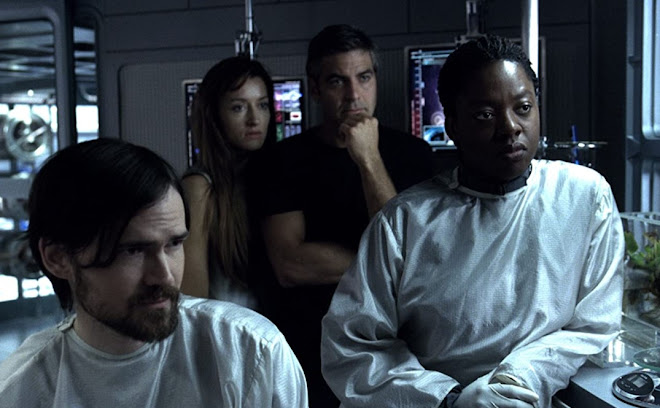Solaris
Four stars
Director:
Steven Soderbergh, based on the novel by Stanislaw Lem
Stars:
George Clooney, Natascha McElhone, Jeremy Davies, Viola Davis, and John Cho
With the
opening scenes of “Solaris,” the mood is unquestionably somber. George Clooney
plays Dr. Chris Kelvin, a psychiatrist who seems to be just going
through the motions. One of the first scenes is him just sitting in bed alone. Many
will recognize in his body language as one of those times where something
weighs on our minds so heavily, it is a Herculean effort just to get up and
begin the day.
Much of this
film is shot in dark, muted colors to further enhance the overall tone. Make no
mistake, science-fiction is the vehicle here. But this is a psychological/existential
thriller, if we must assign labels.
Kelvin is
visited by two strange men who are part of a private company that has taken
over a mission from NASA. Kelvin’s friend, Dr. Gibarian (Ulrich Tukur) and a small
crew are aboard a space station orbiting the planet Solaris. Gibarian has sent
a cryptic video message to Kelvin specifically, imploring him to come and help
with a problem aboard the space station. The company the two men represent is studying the unique
planet as a possible source of energy.
What we
discover soon after Kelvin arrives aboard the station is that two crew members
are dead, including Gibarian, and the remaining two crew members, Snow (Jeremy
Davies) and Dr. Helen Gordon (Viola Davis) are unnerved by something. Gordon
sequesters herself in her room and Snow is disconnected from reality. They are
understandable reactions to something that defies comprehension.
The planet
is able to somehow get into the minds of the crew. It intuits who is on the
minds of crew members and then reproduces them in their corporeal form. We learn
that each crew member has a “visitor.”
Kelvin isn’t
immune from visitation. The first night aboard the station, he dreams of his deceased
wife Rheya (Natascha McElhone), and the first day they met at one of Gibarian’s
parties. But as he dreams of making love to her not long after they first met, director
Steven Soderbergh then intersperses the scenes at the party with short cuts of
Rheya and Chris together on the ship. The suggestion here is that dream and
reality become intertwined and Kelvin is delirious enough that he can’t tell
the difference. At this point in the film, you have to wonder whether the
planet is able to deliberately blur the distinction between the two.
When Chris wakes
up and is coherent enough, he realizes that what he thought was a dream about
making love to Rheya aboard the ship was real. Clooney’s looks of pure sorrow,
grief and confusion are extraordinary. This was one of the first times I
realized how good an actor Clooney could be.
Rheya can’t
remember specifics about her life and her time together with Chris. The only
things she seems to remember are the times she shares with him. She has no
memories of her life before she met Chris. She sees images in her mind, and they are
familiar to her, but she can’t provide context to any of them. That’s because
they are Chris’ memories, not hers. His memories have been transplanted into
her mind.
She is self-aware,
though. At one point she acknowledges she isn’t the person she remembers. At
one point she asks him “don’t you love me anymore,” as if she knows something
significant has happened between them but isn’t quite sure what.
Half-way
through the film, I pondered why the planet would do this. Is it that the
planet is actually a living being? If this space company goes about trying
to harvest the planet for energy, does the planet do this as a defense
mechanism to ward off any threats? It seems plausible. In one of the flashback
scenes to Gibarian’s party, he mentions that the planet seems to react to being
observed. Species have evolved to develop defense mechanisms to protect them
from predators. If that is the case here, there is elegance in the simplicity
of this defense mechanism as opposed to some sort of violent reaction.
Chris knows
intellectually that this woman who looks, talks, and acts like his deceased
wife can’t really be her. So he is left with a painful decision what to do
about her and the rest of the crew. With this version of Rheya, we are left to
question ourselves as to whether we really truly know someone even though we get
very close to them.
“Solaris”
doesn’t take any easy outs as it marches toward its conclusion. And as it
approaches the end, I found myself really questioning the entity that was
Solaris. The possibilities seemed to grow as the film wound down. I asked myself
whether the planet itself had a consciousness or was it acting solely on instinct.
And then I began to wonder if the planet was actually some sort of omnipotent
being. I saw many similar existential/philosophical questions in another fantastic
science-fiction film, “Arrival.”
Despite
raising more questions for me than providing answers, “Solaris” is a remarkable film with an ending
that is open-ended but still satisfying.



Comments
Post a Comment